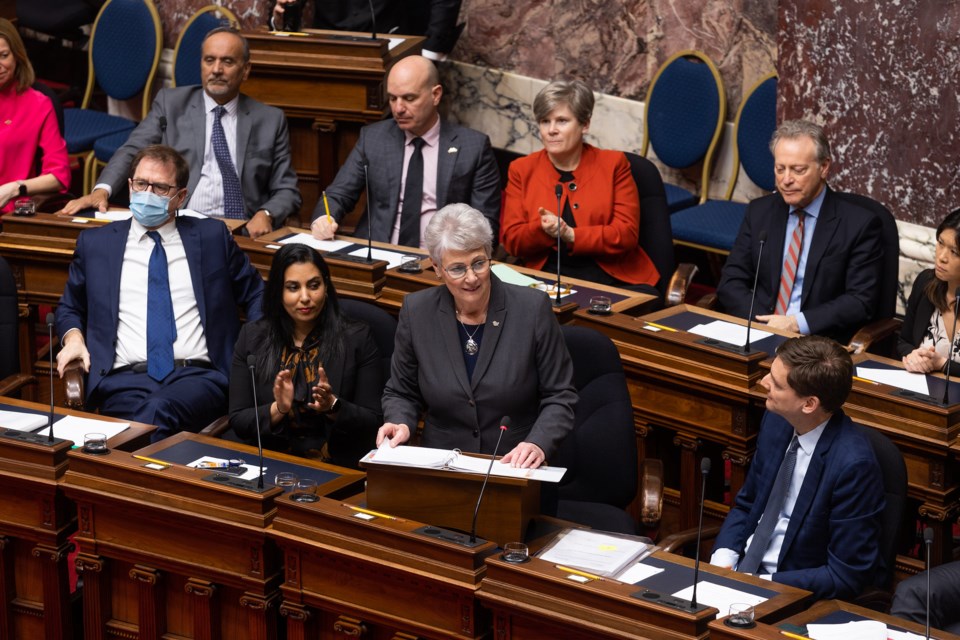The province’s flurry of housing announcements that began last fall may no longer be captivating some stakeholders in quite the same way.
The NDP government has recently introduced new legislation aimed at encouraging more supply, unveiled details of its signature BC Builds housing program and last week allocated additional funding in its latest budget.
Anne McMullin, president and CEO of the Urban Development Institute industry association, described this year’s budget as “underwhelming.”
“We view this budget as a missed opportunity to take meaningful steps to bring down the cost of delivering housing or support infrastructure delivery,” McMullin said in a statement to Glacier Media.
Budget 2024 features a new tax on flipping homes, expansions on existing tax measures and funding for the recently announced BC Builds program.
“The big housing news was in the last budget and the budget before that,” said Thom Armstrong, CEO of non-profit Co-operative Housing Federation of BC.
“We went into this year's budget exercise wanting to be assured that the commitments that have already been made carry through, and they did. … All of the housing commitments are intact. In fact, in some cases, have been beefed up a bit to account for inflation and interest rate increases.”
The housing initiatives introduced in Budget 2024 are part of the Homes for People plan, which was a key piece of last year’s $4.2 billion in housing spending.
Armstrong said that the new BC Home Flipping Tax, which is similar to the Speculation and Vacancy Tax, is getting the most attention but that he doesn’t see it as having a big impact.
The tax is aimed at discouraging investors from driving up prices. Its aim is to collect profit made from selling a residential property within two years of buying it.
“It's not designed to stop flipping. It's designed to say to people who can afford to do that, if you're going to make money that way, you're going to have to share it with people who are less fortunate. So, that's fine,” he said.
BC United, the province’s official opposition, said that the new exemptions to the Property Transfer Tax won’t go far enough in comparison to their housing plan released on Feb. 15.
The exemption increases the threshold for the First Time Homebuyers program from $500,000 to $835,00, with the first $500,000 completely exempt from the property transfer tax.
“The property transfer tax for first-time buyers only applies to the first $500,000 of a home, which will only save homebuyers $8,000, compared to BC United’s plan which will save people up to $18,000 due to our raising of the exemption threshold to $1 million,” the party said in a statement.
When it comes to tax measures, McMullin said that she is “disappointed to see more demand-side measures introduced,” but that changes to the Property Transfer Tax are welcome.
Included in Budget 2024 is $198 million in new funding for the multibillion-dollar BC Builds program, which aims to provide low-cost financing to build rental property developments on land owned by governments, First Nations and non-profits, and is geared towards creating housing for what the province describes as middle-income earners.
Prime Minister Justin Trudeau arrived in Vancouver days ahead of the provincial budget’s unveiling to announce Ottawa would be adding $2 billion in financing to BC Builds.
“That dwarfs anything that we saw in the budget on the housing front because it's such a game changer. We are very excited about that,” said Armstrong.
BC Builds will also rely on partnerships with the private development community, something that McMullin said she was glad to see.
However, one thing that is missing in this year’s budget is the allocation of new funds to support the Aboriginal Housing Management Association's (AHMA) Urban, Rural and Northern Indigenous Housing Strategy.
Federal Budget 2023 proposed allocating $4 billion nationally over seven years starting in 2024 to implement an Indigenous housing plan. That came in addition to Budget 2022's $300-million commitment, according to Canada Mortgage and Housing Corp.
“Indigenous housing providers across B.C. are struggling to survive with shoestring budgets that pay workers a bare minimum and leave operational budgets not able to keep pace with rising costs,” said Margaret Pfoh, CEO of the AHMA.
“An equity-based approach to housing centres Indigenous rights and Indigenous leadership. Our housing societies have long been providing culturally supportive, trauma-informed housing for those most in need and now they are struggling to survive due to a dire lack of funding.”



